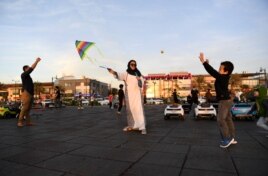13 April, 2018
Life for women in Saudi Arabia is changing quickly. They are now experiencing new freedoms, such as riding a bicycle. The government announced the new policy earlier this month.
These freedoms are important for Saudi women like Amirah al-Turkistani.
In 2015, Amirah finished her studies in the American city of Boston. While living in Boston, she rode a light green bicycle. When she was preparing to return to her home in Jeddah, she decided to take her bicycle with her.
Her friends laughed at the idea.
"They told me, ‘What will you do with it in Jeddah, hang it on the wall?'" she said.
Riding a bicycle in public as a woman was unthinkable at the time. In Saudi Arabia, religious police watch public spaces to enforce conservative dress rules, bans on music and alcohol, prayer-time store closures and the mixing of unrelated men and women.
Now, three years later, Amirah often rides her same green bicycle along Jeddah's seaside paths. Sometimes she rides by herself, other times with her husband and children.
The new policy says that women must still be covered in an abaya when riding a bike. Abayas are loose-fitting, full-length robes. They are required public dress for Saudi women.
But abayas are changing, too. In the past, women could only where traditional black abayas. Now, Amirah chooses from several colors of abayas. She designs them herself.

Amirah al-Turkistani, a graphic design lecturer at Jeddah International College
"Jeddah today isn't the same as Jeddah five, six years ago," she said. "The scrutiny on clothes (has eased), there's more places to go, working opportunities for women are the same as for men."
In recent years, Saudi Arabia has been changing from its more traditional past.
Under a reform program aimed at modernizing the kingdom and reducing its economy's dependence on oil, Crown Prince Mohammed bin Salman has eased social restrictions. He has also ended a 40-year ban on movie theaters. And he has reduced the activities of the religious police.
Last year, the government announced it would permit women to drive cars, something Amirah is very ready for.
"It's not like I want to drive just because I want to drive," she said. "It's a need."
Amirah is a 30 year-old mother of two children. She has a full-time job teaching graphic design at Jeddah International College. She works on other design projects outside of work, as well. And she sells her handmade abayas.
In her free time, she does yoga. She also does strength training at an exercise center.
Amirah is part of a young generation of Saudi women seizing new chances.
Yet she realizes that not all women in this country of 32 million people have the same chances as her. Tribal customs, authoritative male relatives and religious conservatism keep many Saudi women from having the same rights.
"She can be (modern) but her family isn't," Amirah says of Saudi women. "She can be like this but her husband doesn't allow it." She adds that she believes some people oppose the new reforms.
"There's a change, that's true, but I'm talking about something very miniscule," she said. "I don't know about other places, other cities. I'm just talking about Jeddah."
I'm Phil Dierking.
This story was originally reported for Reuters News Agency. Phil Dierking adapted the report for Learning English. Ashley Thompson was the editor.
What are other freedoms that you think all women should have? Write to us in the Comments Section or on 51VOA.COM.
______________________________________________________________
Words in This Story
authoritative - adj. having or showing impressive knowledge about a subject
graphic - adj. relating to the artistic use of pictures, shapes, and words especially in books and magazines
minuscule - adj. very small
opportunity - n. an amount of time or a situation in which something can be done
robe - n. a long, loose piece of clothing that is worn on top of other clothes to show that someone has a high rank or an important job
scrutiny - n. the act of carefully examining something especially in a critical way
yoga - n. a system of exercises for mental and physical health